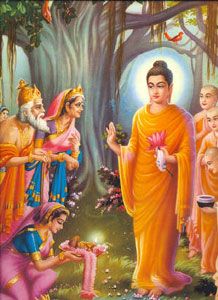Prince Siddharta Gautama was born some 2,500 years ago as a prince in what is now called Lumbini in Nepal. At his birth, many special signs appeared. His father asked a sage living in his kingdom for advice on his son. The sage predicted that Gautama would become either a great King or a great spiritual teacher. The King wanted his son to be his successor and tried to keep his son far away from all matters of life that could incline him to a spiritual life. Gautama usually spent his life in his father’s palace, surrounded by all possible luxuries of the time. He proved to be a special child, being quite intelligent as well as an excellent sportsman. He married to a beautiful woman he loved, and they had a son.
 When he was 29 years old, he discovered there was much suffering in the world around him. Traditionally it is explained that he suddenly recognised the problems of sickness, old age and death when visiting the city. Being shocked by the suffering of all living beings, he decided to search for way to end it. He left his wife and child, the palace and even his royal clothes, and started out on a spiritual quest. Gautama studied under various teachers and followed their practices until he mastered them all. His first teacher was Alara Kalama who taught a form of meditation leading to an exalted form of absorption called “state of no-thingness”, a state without moral or cognitive dimension. Gautama saw this was not going to solve suffering, and continued his search. The next teacher was Udraka Ramaputra who taught him meditative absorption leading to “the state of neither perception nor non-perception”. Again, Gautama realised this was not the state he was looking for. (Both Alara and Udraka are by some scholars considered Jain followers.)
When he was 29 years old, he discovered there was much suffering in the world around him. Traditionally it is explained that he suddenly recognised the problems of sickness, old age and death when visiting the city. Being shocked by the suffering of all living beings, he decided to search for way to end it. He left his wife and child, the palace and even his royal clothes, and started out on a spiritual quest. Gautama studied under various teachers and followed their practices until he mastered them all. His first teacher was Alara Kalama who taught a form of meditation leading to an exalted form of absorption called “state of no-thingness”, a state without moral or cognitive dimension. Gautama saw this was not going to solve suffering, and continued his search. The next teacher was Udraka Ramaputra who taught him meditative absorption leading to “the state of neither perception nor non-perception”. Again, Gautama realised this was not the state he was looking for. (Both Alara and Udraka are by some scholars considered Jain followers.)
Next, he tried extreme ascetic practices at Uruvilva, with five other ascetics who turned into his followers. In the end, Gautama nearly died of starvation. After about six years of searching, he realised that just wearing down his body did not generate new insights, but rather leads to weakness and self-destruction. When he decided to give up extreme asceticism, his students left him. He then sat down in a place now called Bodhgaya (North India) under a Bodhi-tree and decided not to get up anymore until he discovered the truth. Just a short time later, he became a fully enlightened Buddha. This means that he actualised all positive potentials of a sentient being and rid himself of all negative qualities. With this, he realised the true nature of existence and suffering (emptiness), and how suffering can be ended. (On the left is a descendant of the original Bodhi tree in Bodhgaya.)
Seven weeks after enlightenment, the Buddha gave his first discourse in Sarnath, near Varanasi (see image on the right). Here he taught the 4 Noble Truths. The Buddha continued to teach during his life, until passing away at the age of 81. The Buddha once summarised his entire teachings in one sentence: “I teach about suffering and the way to end it”. The main disciples of the Buddha are also known as the Great Arhants: Shariputra, known for his understanding of the Abidharma teachings; Maudgalyayana, known for his psychic powers; Mahakashyapa, the great ascetic; and Ananda, the personal attendant of the Buddha who recalled every word the Buddha spoke. The Buddha’s life is also sometimes summarized in the so called ‘Twelve Deeds of the Buddha’.